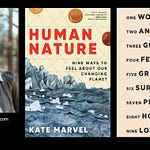Let’s get this over at the top: I love the six-part PBS series A Brief History of the Future - as you’ll hear and see in this Sustain What episode. As I told my guests, Ari Wallach and Kathryn Murdoch, “You think of these grand-scale challenges as being global and not something that individuals need to think about, but anyone planning a future for their family or their community can draw lessons from this fine show.”
Wallach, the energetic and engaging on-screen host of the series, is a futurist and consultant and author of “Longpath: Becoming the Great Ancestors Our Future Needs – An Antidote for Short-Termism.”
Murdoch, who has worked for many years in marketing and communication around social and environmental issues, is co-founder and president of Quadrivium Foundation, which supports work sustaining democracy, a livable climate and harmonizing technology with human needs. She is an executive producer of the series, which is the first output from Futurific Studios, a multi-media production house she co-founded with Wallach. Their goal is to open a storytellng space between dystopian content and unachievable utopias. They embrace the concept of “protopia” (visit Wired founding editor Kevin Kelly for the origin story).
A “protopian” view of building a thriving future
As Wallach says, “We know dystopia - terrible. And utopia is usually just a dystopia in disguise. And protopia is this dea of better tomorrows, where we're getting more things right, but it's not perfect.”
You can watch our conversation above, or watch and also share the show (please!) on YouTube, LinkedIn, X/Twitter and Facebook. For those who need or prefer written text instead of images and voices, here’s the dynamic (and rough!) Trint transcript. (Support Sustain What financially and transcripts and other stuff will improve.)
In the series, artfully written and directed by Andrew Morgan, Wallach leads viewers through six rich episodes showing that futuring (he likes “to future” as an active verb) isn’t some abstract, meta, touchy-feely activity; it’s a process and mindset that can be integrated into concrete decisionmaking at levels from a town to global affairs to multi-generational “cathedral building” science projects like fusion.
Wallach starts with the brain, which has circuitry that is not really fit for purpose if the hope is to robustly integrate future needs into choices we make now. A psychologist offers him a peek at his future self to jog things:













